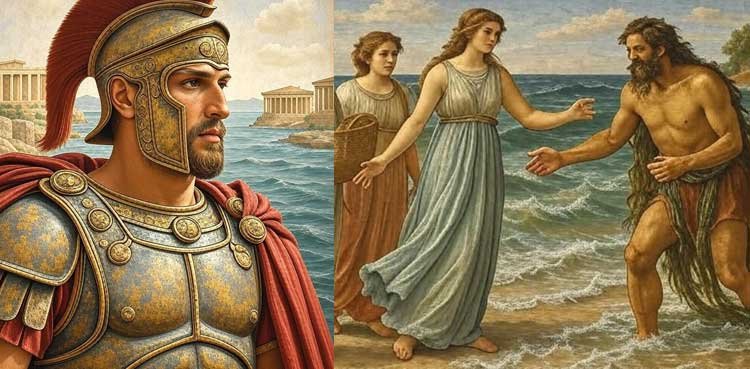
Homer’s Odyssey, an ancient Greek epic poem from around the 8th century BCE, stands as a cornerstone of Western literature. This timeless tale of adventure, resilience, and the human spirit continues to captivate readers worldwide. With a new movie adaptation in development, interest in The Odyssey is surging.
Today, we will delve into the epic’s plot, main themes, key heroes, historical context, and the exciting prospect of a cinematic retelling, offering an accessible guide for all readers.
Plot of The Odyssey: A Journey of Trials and Triumph
The Odyssey chronicles the epic ten-year journey of Odysseus, the cunning king of Ithaca, as he strives to return home after the Trojan War. Written in 24 books and composed in dactylic hexameter, the poem weaves a rich tapestry of myth, adventure, and human struggle:
Adventures and Challenges: Odysseus faces a series of perilous trials orchestrated by gods, monsters, and nature. He outwits the Cyclops Polyphemus, navigates the enchanting spells of Circe, and resists the seductive songs of the Sirens. His journey is fraught with dangers, including the treacherous sea monsters Scylla and Charybdis, and the wrath of Poseidon, who seeks vengeance for Odysseus blinding his son, the Cyclops.
Return to Ithaca: After a decade of trials, Odysseus reaches Ithaca to find his palace overrun by suitors vying for his wife Penelope’s hand. With his characteristic cunning and the aid of his son Telemachus, he defeats the suitors, reclaims his throne, and reunites with his family.
Narrative Style: The story unfolds non-linearly, with flashbacks and divine interventions, creating a dynamic narrative that keeps readers engaged from start to finish.
This gripping saga of survival and heroism makes The Odyssey a must-read for anyone fascinated by epic adventures and storytelling.
The Odyssey trailer leaks online
Main Themes in The Odyssey: Timeless Lessons
The Odyssey explores universal themes that resonate across cultures and eras, offering profound insights into the human condition:
Heroism and Cunning: Odysseus embodies a unique heroism defined by intelligence and resourcefulness. His clever tactics, like the Trojan Horse and his escape from the Cyclops, highlight wit as a powerful tool for overcoming adversity.
Loyalty and Perseverance: Penelope’s steadfast loyalty, as she fends off suitors for years, and Odysseus’s unwavering determination to return home underscore the value of fidelity and endurance.
Homecoming (Nostos): The concept of nostos, or the longing for home, drives the narrative, reflecting a universal human desire for belonging and stability.
Hospitality (Xenia): Ancient Greek culture placed great importance on hospitality, and The Odyssey illustrates its significance through rewards for kindness and punishments for violations, such as the suitors’ greed.
Fate vs. Free Will: The interplay between divine intervention and human agency is central, as gods like Athena aid Odysseus, while his choices shape his destiny, raising questions about control and destiny.
These themes ensure The Odyssey remains relevant, offering lessons on resilience, loyalty, and the human spirit that appeal to modern readers.
Major Heroes in The Odyssey: Iconic Figures
The epic’s compelling characters bring its themes to life, each contributing to the story’s emotional and adventurous depth:
Odysseus: The resourceful hero, celebrated for his intelligence, bravery, and leadership. His cunning, seen in strategies like the Trojan Horse, makes him a standout figure in Greek mythology.
Penelope: Odysseus’s devoted wife, whose intelligence and loyalty shine as she cleverly delays suitors, preserving her family’s legacy through patience and strength.
Telemachus: Odysseus’s son, who evolves from a hesitant youth to a courageous figure, aiding his father in reclaiming their home and proving his own heroism.
Athena: The goddess of wisdom, who serves as Odysseus’s divine protector, guiding him through trials and symbolizing divine favor and intellect.
These characters, with their distinct qualities, make The Odyssey a rich character-driven narrative that continues to inspire.
Historical Context: A Window into Ancient Greece
Composed around the 8th century BCE, The Odyssey emerged during a pivotal period in ancient Greece, transitioning from the Dark Ages to the Archaic period. Its historical context enriches its significance:
Oral Tradition: Likely composed for oral performance, the epic’s rhythmic dactylic hexameter and formulaic phrases suited bards who memorized and recited it, preserving Greek stories and cultural identity.
Cultural Values: The poem reflects ancient Greek values like xenia (hospitality), honor, and reverence for the gods, which shaped social interactions and moral codes.
Myth and History: While steeped in mythology, The Odyssey may draw on historical memories of Bronze Age trade routes and the Trojan War, blending fact and legend to create a vivid narrative.
Social Structure: The epic portrays a hierarchical society with kings, gods, and mortals, offering insights into ancient Greek governance, family roles, and religious beliefs.
This context makes The Odyssey not only a story but also a cultural artifact, illuminating the world of ancient Greece.
Upcoming Odyssey Movie: A New Chapter
Excitement is building for a new movie adaptation of The Odyssey, currently in development. This cinematic retelling promises to bring Odysseus’s epic journey to life with modern visual effects, capturing the grandeur of his adventures and the emotional weight of his homecoming. While details about the cast, director, and release date remain under wraps, the project is generating buzz among fans of Greek mythology and epic films. The movie aims to introduce Homer’s classic to a new generation, blending timeless themes with contemporary storytelling to ensure its enduring appeal.
Why The Odyssey Endures
Homer’s Odyssey remains a cultural touchstone, influencing literature, film, and storytelling for centuries. Its exploration of heroism, loyalty, and the quest for home resonates with audiences today, from students studying ancient texts to casual readers seeking adventure. The upcoming movie adaptation further underscores its relevance, promising to reimagine Odysseus’s journey for modern viewers. Whether you’re drawn to epic tales, Greek mythology, or universal human struggles, The Odyssey offers a captivating blend of action, emotion, and wisdom.
Dive into Homer’s Odyssey and discover why this ancient epic continues to inspire readers and filmmakers alike!




